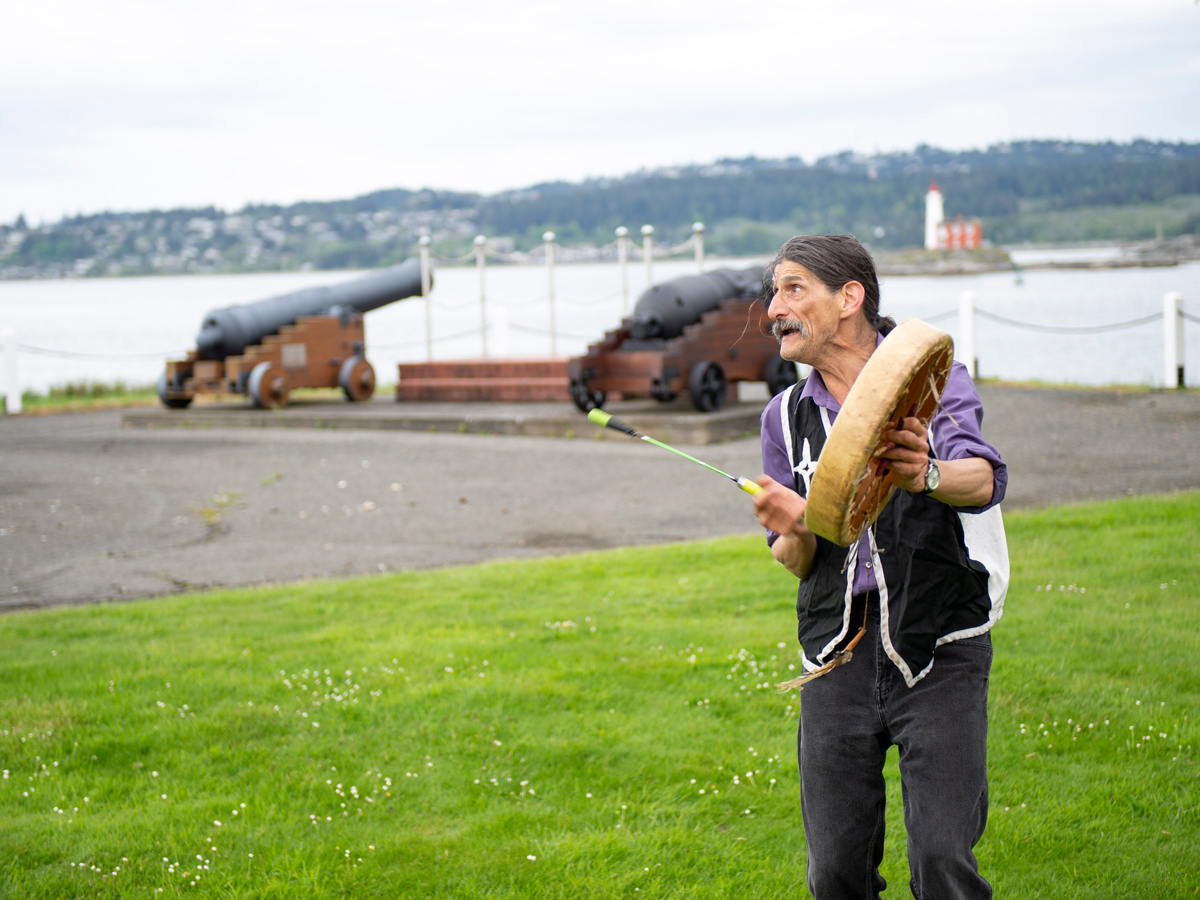Base elder ‘travels’ into retirement
By Lookout on May 14, 2020 with Comments 1
Peter Mallett, Staff Writer ~
Two weeks ago, Bill Stewart, 62, grabbed his drum and headed to Duntze Head to perform an Aboriginal drumming session one final time.
After 27 years at Fleet Maintenance Facility Cape Breton (FMF CB), the Ahousaht First Nation member decided to retire from his Technical Data Specialist position. The April 29 drumming and chants of his Travelling Song, with the Esquimalt harbour as back drop, marked his departure from the base.
“The song is a message of hope to those in combat or travels, sending good luck in travels wherever one goes,” he explains. “I do it to help people understand Aboriginal culture is in harmony with our workforce, and to make sure we understand and respect the First Nations land on which we live, work, and play.”
He began working at CFB Esquimalt in 1993 with Base Construction Engineering (now Real Property Operations) as a term clerk. A month and a half later he was hired at Naval Engineering Unit (Pacific) (now FMF Cape Breton) as Duplicating Equipment Operator that was reclassified to Technical Data Specialist in 2004.
After receiving a DND Scholarship award in 2003, he continued to work part time until he obtained an Associate Degree in Indigenous Business Leadership. He then became the FMF Cape Breton Technical Information Centre drawings guy for 27-plus years. To continue with the superior customer service, he transferred all his knowledge into an e-file (manual) for future employee reference.
“He has extensive knowledge and has been a huge asset to FMF Cape Breton’s Technical Information Centre,” said Syndi Baker, department coordinator. “He is friendly, cheerful, and always ready to lend a hand to co-workers and management.”
He was born and raised in Ahousaht First Nation areas, a tiny community located north of Tofino, B.C. His traditional name is (h)ooo-tuk-siah, meaning always learning, and Cu-Cuk, a hereditary name meaning keeper of Anderson Creek, locates his home reserve on Flores Island. He now resides in Lake Cowichan with his partner Juanita Sylvester and gets regular visits from their six children, numerous foster-adults, and 31 grandchildren.
A few years after joining the base, he helped create the Defence Aboriginal Advisory Group, which advises leadership on First Nation issues. He hopes improvements to an inclusive workforce, reconciliation, and cultural understanding will continue following his departure.
“The new generation will be eager for the challenges they will encounter, and perhaps win,” said Stewart. “Diversity is a reward for everyone, and embracement of a very diverse workforce brings the best ideas out together, so please keep doing that.”
With the base in his rear-view mirror, Stewart is looking to expand his home-based business Ooo-Tuk-Siah Consulting Services. He’s also reaching for the keyboard to complete his autobiography entitled Hear Me Here Now, which highlights the struggles, challenges, and successes of a deaf Aboriginal. Stewart is 90 percent deaf, but over the years he has developed a “quite proficient” understanding of what others are saying through his lip-reading skills.
For those wanting to wish him well, email him at szloukum1958@outlook.com
–––
Filed Under: Top Stories
About the Author:







While I was raised in the Ahousaht and Hesquit Traditional areas up until age 9, I was born in Tofino, BC.
The book will explain all of this to prevent misunderstandings.
Thanks for reading.
Bill